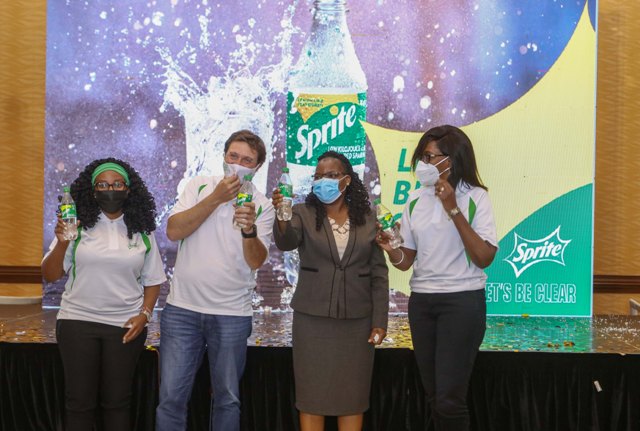Share this
The Coca-Cola system in Kenya has today unveiled a new iconic look of its leading sparkling soft drink Sprite. The lemon-lime flavored Sprite will now be packaged in a clear PET (polyethylene terephthalate) plastic bottle, marking a historic shift from the green-colored plastic bottle which has been its identity since 1960 when it was first launched.
This shift from the iconic green bottle means more Sprite bottles can be collected, recycled and reused to make new items, in line with Coca-Cola’s World Without Waste vision, which targets to collect and recycle the equivalent of every bottle or can it sells by 2030, as well as use 50% recycled content in all its packaging.
“Our people in Kenya can now enjoy the refreshing taste of their favourite sparkling lemon-lime drink knowing their bottle can be easily recycled and made into new items. This is a plus in our joint efforts to grow our business while contributing towards more sustainable environmental practices,” said Xavi Selga, Managing Director, Coca-Cola Beverages Africa (CCBA) – Kenya during the launch in Nairobi.
Clear PET can be recycled and re-used to make a wider range of new products, such as pillow and duvet inners, as well as new bottles, making it more valuable than green PET, which has limited uses.
Kenya becomes the 4th African market where Coca-Cola has introduced the Sprite clear PET, after South Africa, Nigeria and Ethiopia.
“The shift from the green bottle to clear PET is a significant step in driving our sustainability agenda which is a key element of our business. We know that our vision for a World Without Waste is ambitious and can be challenging but together with our partners, we are committed to the cause. This move also allows us to work with partners in the recycling industry, and with waste collectors and aggregators to achieve more value for our recyclable plastics,” said Debra Mallowah, Vice President, Coca-Cola East and Central Africa Franchise.
“The World Without Waste” strategy represents Coca-Cola’s commitment to doing business sustainably, and this includes addressing the packaging waste challenge. Additionally, clear PET plastic contributes to economic empowerment as it will lead to enhanced income for waste reclaimers in Kenya who depend on collecting and selling packaging waste for a living,” added Mallowah.
With presence in over 200 countries, including Kenya, Coca-Cola Sprite’s new transparent look features a clear see-through bottle, refreshed icon of the brand’s bold Sprite ‘spark’ with a distinct label and bright green cover.
“Our consumers are at the heart of everything that we do and we would like to assure them that the new look Sprite is bolder and better with an improved recipe that will deliver the most refreshing lemon lime taste,” said Isabelle Kariuki-Rostom, the Franchise Marketing Director, Coca-Cola East and Central Africa Franchise.
The new look Sprite will be available in all retail outlets and Coca-Cola distributors across the country starting June this year as the company clears out the green packaging from the shelves and the trade to ensure complete transition into the clear bottles.
Coca-Cola is one of the members of PETCO Kenya (PET Recycling Company Ltd), an industry-led extended producer responsibility PET recycling scheme, comprised of 16 industry players from different sectors. PETCO seeks to coordinate initiatives to collect, sort and recycle plastic bottles, with broader focus on sustainable management of PET material after their initial use. This is done in partnership with recyclers who create new products out of disposed PET material.
Since Sprite was launched in 1960, it has been synonymous with its iconic green bottle and this marks a major milestone in its growth and sustainability in various markets. With the clear PET plastic, Sprite bottles have a higher chance of being collected, recycled and reused, thus creating a circular solution for plastic.
The new clear/transparent Sprite PET bottle is 100% recyclable, and therefore increases the value of the plastic in the after-use market and its ability to remain in the circular economy to be re-used for different purposes.





